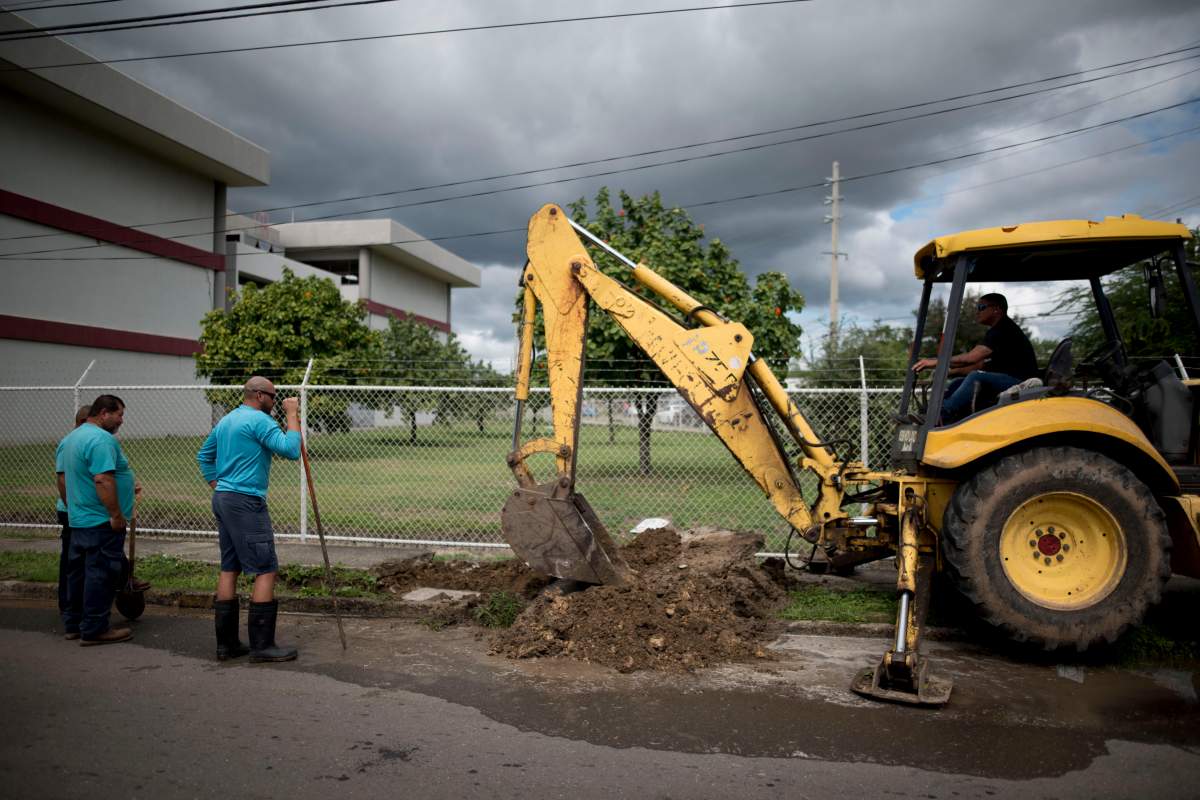A 6.4-magnitude earthquake struck Puerto Rico before dawn on Tuesday, killing one man, injuring at least eight other people and collapsing buildings in the southern part of the island.

The quake was followed by a series of strong aftershocks, part of a 10-day series of temblors spawned by the grinding of tectonic plates along three faults beneath southern Puerto Rico. Seismologists say it’s impossible to predict when the quakes will stop or whether they will get stronger.

The 6.4-magnitude quake cut power to the island as power plants shut down to protect themselves. Authorities said two plants suffered light damage and they expected power to be restored later Tuesday. Puerto Rico’s main airport was operating normally, using generator power.
“I’ve never been so scared in my life,” said Nelson Rivera, a 70-year-old resident who fled his home in the city of Ponce, near the epicenter of the quake. “I didn’t think we would get out. I said: `We’ll be buried here.”’
Puerto Rico’s governor, Wanda Vasquez, declared a state of emergency and activated the territory’s National Guard. She said some 300,000 households remained without running water by late Tuesday afternoon, and several hundred people were in shelters in affected municipalities. She said she had not spoken to President Donald Trump by late morning.
Teacher Rey Gonzalez told The Associated Press that his uncle was killed when a wall collapsed on him at the home they shared in Ponce. He said 73-year-old Nelson Martinez was disabled and that he and his father cared for him.

Eight people were injured in Ponce, Mayor Mayita Melendez told WAPA television. Hundreds of people sat in the streets of the city, some cooking food on barbeque grills, afraid to return home for fear of structural damage and aftershocks.
The U.S. Geological Survey said the quake hit at 4:24 a.m. just south of the island at a shallow depth of six miles (10 kilometres). It initially gave the magnitude as 6.6 but later adjusted it. At 7:18 a.m., a magnitude-6.0 aftershock hit the same area. People reported strong shaking and staff at a local radio station said live on air that they were leaving their building

Get daily National news
A tsunami alert was issued for Puerto Rico and the U.S. Virgin Islands after the initial quake, then cancelled.
U.S. President Donald Trump was briefed on the earthquakes in Puerto Rico in the past month, including the one on Tuesday, said Judd Deere, White House deputy press secretary.
“Administration officials, including FEMA Administrator Pete Gaynor, have been in touch with the Governor and her team today, and we will continue to monitor the effects and co-ordinate with Puerto Rico officials,” Deere said.
In the historic district of Ponce, authorities evacuated more than 150 people from two buildings they said were in danger of collapsing. Among them were more than two dozen elderly patients from a nursing home who sat in their wheelchairs in silence as the earth continued to tremble.
Amir Seneriz leaned against the cracked wall of his Freemason Lodge in Ponce and wailed.
The roof of the 1915 building was partially collapsed and dust and debris lay around him.
Outside, he had already carefully placed 10 large historic paintings. The earth continued trembling as he went back into the building to recover more artifacts.
Helping him was artist Nelson Figueroa, 44, who said he slept in his street clothes.
“It was chaos,” he said, adding that there was a traffic jam in his coastal neighbourhood as terrified people fled.
Much of the damage was reported in the southwest coastal town of Guayanilla, where the mayor said the municipality won’t have power for at least two weeks.
A 19th-century church in Guayanilla partially collapsed.
Ruth Caravallo, 73, held on to the church’s wrought-iron gate as she cried.
“My sister was the secretary here,” she said. “My husband died two months ago, and I held services for him here.”
Around the corner, Father Melvin Diaz spoke to a friend on the phone and described damage to the church’s icons.
“The Virgin fell, Saint Judas is intact,” he said, chuckling.

Diaz surveyed the collapsed church and said he was optimistic about rebuilding.
“This isn’t a problem, it’s a challenge,” he said.
Some people rode their bicycles around the public plaza while others sought shade under lush trees that shook occasionally as the aftershocks continued.
In one corner of the plaza, 74-year-old Alvin Rivera paused as he scrutinized the damage around him.
“It’s terribly sad,” he said. “People are panicked.”
A 5.8-magnitude quake that struck early Monday morning collapsed five homes in Guanica and heavily damaged dozens of others. It also caused small landslides and power outages. The quake was followed by a string of smaller temblors.
The shake collapsed a coastal rock formation that had formed a sort of rounded window, Punta Ventana, that was a popular tourist draw in Guayanilla.
Residents in the south of the island have been terrified to go into their homes for fear that another quake will bring buildings down.
The flurry of quakes in Puerto Rico’s southern region began the night of Dec. 28. Seismologists say that shallow quakes were occurring along three faults in Puerto Rico’s southwest region: Lajas Valley, Montalva Point and the Guayanilla Canyon, as the North American plate and the Caribbean plate squeeze Puerto Rico.
One of the largest and most damaging earthquakes to hit Puerto Rico occurred in October 1918, when a magnitude 7.3 quake struck near the island’s northwest coast, unleashing a tsunami and killing 116 people.








Comments
Want to discuss? Please read our Commenting Policy first.